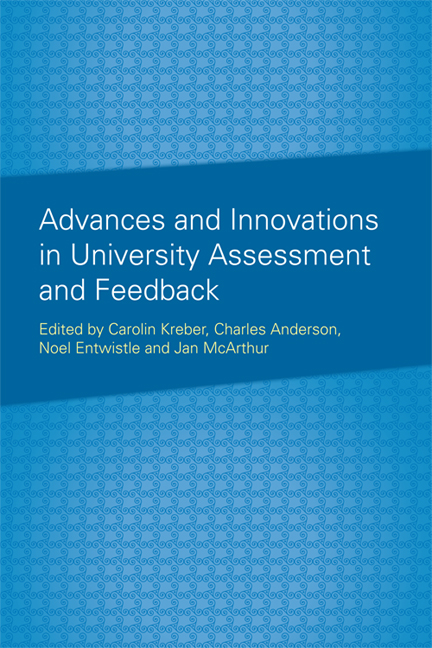Book contents
- Frontmatter
- Contents
- List of Tables and Figures
- Acknowledgements
- Foreword
- Introduction
- Part A Changing Perspectives on the Nature and Purposes of Assessment
- Part B Students' Perceptions of Assessment and Feedback
- Part C Reconceptualising Important Facets of Assessment
- 7 Only Connect? Communicating Meaning through Feedback
- 8 Learning from Assessment Events: The Role of Goal Knowledge
- 9 The Learning–Feedback–Assessment Triumvirate: Reconsidering Failure in Pursuit of Social Justice
- Part D Innovations in Assessment Practices
- Notes on the Contributors
- Index
8 - Learning from Assessment Events: The Role of Goal Knowledge
from Part C - Reconceptualising Important Facets of Assessment
Published online by Cambridge University Press: 05 August 2016
- Frontmatter
- Contents
- List of Tables and Figures
- Acknowledgements
- Foreword
- Introduction
- Part A Changing Perspectives on the Nature and Purposes of Assessment
- Part B Students' Perceptions of Assessment and Feedback
- Part C Reconceptualising Important Facets of Assessment
- 7 Only Connect? Communicating Meaning through Feedback
- 8 Learning from Assessment Events: The Role of Goal Knowledge
- 9 The Learning–Feedback–Assessment Triumvirate: Reconsidering Failure in Pursuit of Social Justice
- Part D Innovations in Assessment Practices
- Notes on the Contributors
- Index
Summary
Introduction
The trigger issue for this chapter is a phenomenon that is familiar to many higher education teachers and markers across a wide variety of courses and fields. It is this: when presented with well-formulated and specified assessment tasks requiring extended written responses, certain students consistently fail to undertake the task that is actually specified. Not uncommonly, these students focus on the subject matter itself, rather than on what is to be done with it. They assiduously search for all available information, compile it carefully and expect at least a passing mark. Markers with initial expectations that the responses will be in line with a literal interpretation of the assessment task become frustrated and disappointed when confronted with a steady stream of pedestrian works that do not attend to the set task and represent only lower-order cognitive processes. In many cases, they adjust their marking expectations accordingly. Conversely, when they encounter a student response that tackles the stated problem directly, they liven up and lean towards assigning bonus marks.
Academics can also be baffled when they teach students over a sequence of courses and find themselves repeatedly telling the same students that they have not answered the question. Somehow, the point never seems to get across. This can occur even with students whose depth of knowledge and thinking, when probed conversationally or observed during class interactions, suggests they should be capable of considerably better performance. On a different tack, what if assessment tasks are not well-formulated and specified, but vague and technically deficient? Students then have to guess what was in the examiner's mind when they set these tasks. An incorrect guess (or no conscious guess at all) again sets the stage for a significant mismatch between marker expectations and what the student produces. This results not only in inaccurate appraisals, but also in lost opportunities for students to develop higher-order learning. This chapter sets out an analysis of these problems and offers some proposed strategies aimed at reducing their frequency. Of course, there are always high-performing students who produce high-quality responses every time. They know what to do without detailed explanation, even though creating their responses might require great effort.
- Type
- Chapter
- Information
- Advances and Innovations in University Assessment and Feedback , pp. 152 - 172Publisher: Edinburgh University PressPrint publication year: 2014



